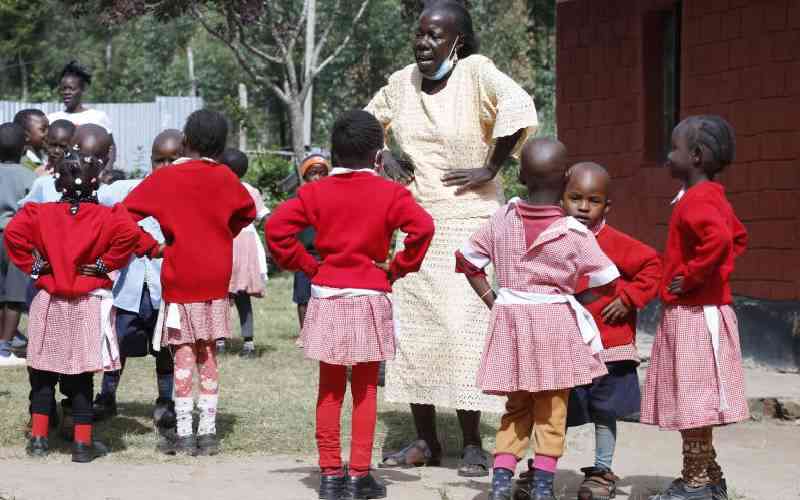Phones Ajayo, a teacher and Director at Phonestar Academy at Bidii Center in Kitale with pupils during break time on June 18, 2021. [File, Standard]
Something is happening in the education system in Kenya. A renewed focus on data and evidence to inform policy decisions is emerging, a silent revolution with the aim of ensuring quality and equitable outcomes for Kenyan children.
But what evidence and data is most needed as Kenya builds on recent gains in areas such as enrollment and Competency-Based Education reform, and now strives to address learning poverty – where four in five children are still not able to read and write at the right level by the age of 10? And where can the evidence be found to inform these efforts?
Answers to these questions began to emerge during the 6th Biennial Conference of the ‘Education Evidence for Action, a partnership between the Ministry of Education, academia, education experts and civil society, in Embu recently. Co-hosted by the Education Deans Forum – Kenya, a consortium of all the Deans of the Schools of Education in Kenyan universities, the conference discussed how evidence can be incorporated in policy formulation to improve learning outcomes for students.
Follow The Standard
channel
on WhatsApp
Education Cabinet Secretary Julius Migos Ogamba, who officially opened the conference, emphasised the importance of applying evidence and data in policy formulation to inform any new interventions, using existing evidence. Further, the Kenya Education Management Information System presents an opportunity to harmonise data systems, generating more powerful analysis to inform progress monitoring, decision making and resource efficiency. What research can help inform this renewed appetite for data and evidence?
One such opportunity to learn from research is in the Global Education Evidence Advisory Panel reports. The key messages emerging from the new research were clear. Get the foundations for learning right. If we want young children to be able to read and write, we first need to ensure they go to school at the right age. It’s not enough to just enroll, they must also attend school every day – a key prerequisite to achieve learning outcomes. When in school, are children well nourished, and are they familiar with the language of instruction? Is there enough lesson time devoted to reading and writing (as well as numeracy, and social emotional development)? In some countries, there is an hour a day on both reading and writing, to give young children the best chance to acquire these key skills. And importantly, is the curriculum relevant to their community and cultural needs and are teachers equipped to deliver the basics of effective pedagogy for reading and writing?
In many parts of Kenya, some of these preconditions for improving the basics are not yet there. Generating better data on where things are working and where the gaps are will allow improved decision making and resource allocation. It could also allow more informed target setting for progress, and ensure education leaders follow through on their promises to improve the quality of education for every child.
The revolution in data and evidence in education has the potential to transform. To realise this, continued commitment from government is needed to focus on the foundations for learning, alongside maximising these new partnerships with academia and civil society to serve this growing appetite for contextually relevant evidence. Ultimately, children still struggling with the basics need this revolution to succeed, to ensure what the evidence shows works is delivered to them.
Mr King is a consultant for the British Council, the convenor of What Works Hub for Global Education in Kenya. [email protected]
Follow The Standard
channel
on WhatsApp
By Richard King


